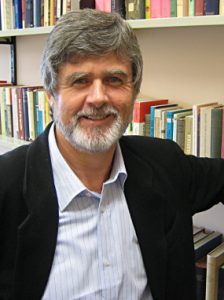 Leslie A. Muray is Professor of Philosophy and Religion at Curry College. We invited him to answer the question “What norms or values define excellent philosophy of religion? as part of our “Philosophers of Religion on Philosophy of Religion” series.
Leslie A. Muray is Professor of Philosophy and Religion at Curry College. We invited him to answer the question “What norms or values define excellent philosophy of religion? as part of our “Philosophers of Religion on Philosophy of Religion” series.
When asked “What are the norms or values that define excellent philosophy of religion,” I think of Whitehead’s norms for judging the excellence of metaphysics. These are: 1. a worldview that is consistent; 2. coherent; and 3. and adequate to the facts of experience. In other words, it will present a comprehensive (but not totalizing) worldview in which “everything hangs together,” in which there are no contradictions.
As far as “religion” in “philosophy of religion” is concerned, true to its etymological roots, the words imply a comprehensive vision of reality in which the parts are not swallowed up but affirmed, in which “the many become one, and are increased by one.” With this kind of emphasis in Western thought, it is easy to see why excellence in “philosophy of religion” has been described with words like “simplicity” and “elegance.” Both of these words, and others like them, are descriptive of philosophical excellence in rational argumentation and systematic thinking.
Thus, if one reads a classic philosophical text from continental philosophy, one would read a meticulously translated, rigorously thought out argument, with positions rebutted and the rebuttal wrestled with and/or rejected. Each topic follows logically from the preceding topic. Whatever school of thought a philosopher belongs to, this is the pattern. They are inviting us into a neatly ordered word.
But what if the world, including the world of the philosophers, is not like that? What if philosophers of religion see their task with greater humility, drawing conclusions with great tentativeness? I am thinking of the ways in which process thinkers Bernard M. Loomer and Bernard E. Meland opted for a more radically empirical version of process than the influential rationalistic one of Charles Hartshorne (Meland in fact was called “a rebel among process theologians).” Meland tirelessly reminded his audiences that “we live more deeply than we can think.”
The kind of philosopher I am thinking of may very well write the kind of rationalistic, scholarly philosophical tracts described above. But there is another kind of writing, sometimes by the same authors (Bergson, Berdyaev, Dewey) who write less specialized, more popular pieces. What they contribute to philosophy is no less important to the norms of excellence of philosophy of religion. A quick example is provided by Whitehead’s The Aims of Education. The three stages of education are romance, precision, and generalization. Precision and generalization are the sorts of philosophical norms we expect-but there is more: romance! There is an emotional tone to all learning, to all life!
I think we have all read works, including by our favorite authors’ that are not well thought out, not well organized-yet they contain gems of insight that one can spend a lifetime looking for and not find. Although I think we can find this with virtually every thinker, I am thinking especially of Bergson and Berdyaev. For Bergson, intuition is the primary way we know things. It can be a motivating factor in other modes of knowledge. It may seem to give incomplete answers. Bergson’s works were condemned by the Roman Catholic Church for “irrationalism.” Berdyaev would get exasperated with people who chided him for his seeming lack of consistency and unremittent emphasis on intuition and creativity. Hartshorne has described his motto as being, “Be creative and foster creativity in others!” Thus, there are elements that go into the making of excellent philosophy of religion, even if seemingly underdeveloped: intuition, insight, creativity. Without these philosophy of any kind does not flourish.
I would like to tell a story that is pertinent to the position espoused here. More than twenty years ago, I was attending a Buddhist-Christian Dialogue which coincided with an Episcopal Chaplains’ meeting at Purdue University. One night at dinner, some of my fellow chaplains and I sat at a table next to which sat three luminaries of the theological world. Langdon Gilkey, Hans Kung, and David Tracy. I overhead David Tracy saying, “If the unexamined life is not worth living, the unlived life is not worth examining.”



